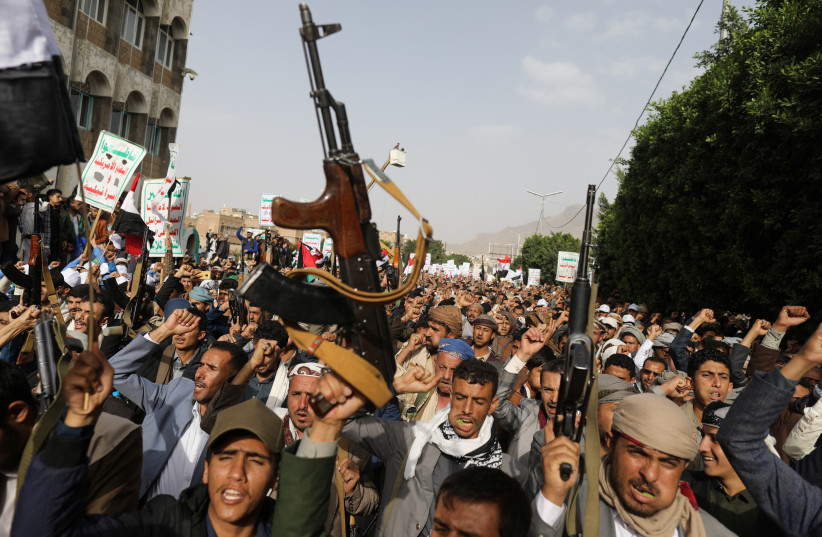The ongoing ground operation by the Israeli Defense Forces (IDF) in the Gaza Strip has had ripple effects in the wider Middle East region. Notably, it has heightened the motivation of Iranian proxies in the area to align with Tehran’s pressure and intensify acts of aggression against Israel. These actions aim to present a “united front” and demonstrate solidarity with the Palestinian cause. One such proxy is the Houthi militia, which controls substantial portions of Yemen and has received support from both Iran and Hezbollah.
The Houthi militia joined the fighting against Israel by launching a series of missile, cruise missile, and drone attacks. These attacks aimed to strike at Israeli targets but were intercepted successfully by Israeli defense systems. The Houthis declared their intent to participate in the conflict on the second day of hostilities, emphasizing their solidarity with the Palestinian people and their role within the broader “axis of resistance.” They stated that they would continue to attack Israel if they perceived Israel’s actions as detrimental to the Palestinian cause.
One of the most significant attacks occurred on October 18, involving the launch of cruise missiles and drones. These missiles briefly entered Saudi Arabian airspace, leading to a heightened state of alert in Saudi Arabia, which shares a border with Yemen. The Houthi involvement in the conflict has implications for other countries in the region, particularly Saudi Arabia and the United Arab Emirates (UAE). There have been accusations that these Gulf states collaborate with Israel in its conflict with Hamas, further complicating the situation.
Why do the Houthi attacks against Israel make the situation more complex?
The Houthi militia’s involvement and statements have added to the regional complexity, particularly regarding Saudi Arabia. While the conflict between the Saudi-led coalition and the Houthi forces has continued for years, a ceasefire had been in place since April 2022. The Houthi government recently reached a draft agreement with Saudi Arabia, according to which many of their financial demands were met. The ongoing ceasefire allowed the Houthis to focus on military buildup, making it less likely for them to risk their newfound gains by provoking a wider regional conflict.
The Houthis receive substantial support from the Quds Force branch of Iran’s Islamic Revolutionary Guard Corps. This includes assistance with weapons smuggling, combat training, funding, and weapons manufacturing. However, their influence over the Houthis is relatively limited in comparison to Hezbollah, and the lack of territorial connection also makes direct support more challenging.

The challenges and restraints that influence the Houthi militia’s actions also apply to Israel. The geographical distance and the complexity of the Yemeni front make it difficult for Israel to develop effective responses to deter further Houthi attacks. Even Saudi Arabia and the UAE, despite their proximity to Yemen, have struggled to deal with Houthi attacks over the years.
Any Israeli response to Houthi attacks would require coordination and consultation not only with the United States, which seeks to prevent a broader conflict, but also with regional partners like the UAE and Saudi Arabia, who share an interest in containing the conflict and avoiding its spread to their territories – Israel has an interest not to risk its relations with them. This dilemma places Riyadh in a complex position; while it seeks to undermine Hamas and the “axis of resistance,” it prefers to remain outside the conflict.
Israel’s primary focus should remain on the conflict with Hamas. Houthi attacks, while concerning, do not pose as significant a threat as groups like Hezbollah and Hamas. Efforts should be made to contain Houthi attacks as long as they do not escalate. However, if the situation worsens, Israel should be careful with its response in order to avoid wider regional implications. The Houthis, under pressure from Iran, Hamas, and Hezbollah, could seek alternative methods of attack, potentially with more significant consequences.
While the Houthi attacks are not as imminent a threat as other regional conflicts, they should not be underestimated, and careful consideration of responses is crucial.
The writer is a senior fellow at the Institute for National Security Studies, an independent think tank affiliated with Tel Aviv University, and a non-resident scholar at the Middle East Institute.
